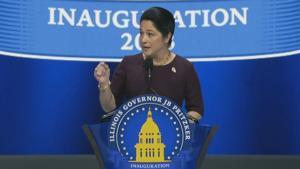(The Center Square) – Now that Illinois is on the way to paying off COVID-related unemployment debts with the federal government, questions are still being raised about how much fraud took place in the state.
Illinois borrowed more than $4.5 billion from the federal government during the benefit to pay surging unemployment benefits, but the state delayed paying all the money back until now.
Gov. J.B. Pritzker this week signed a bipartisan bill that was supported by business and labor groups to pay off the remaining $1.37 billion unemployment trust fund debt using the state’s surplus revenue. Illinois Comptroller Susana Mendoza said she immediately began transferring money to the Illinois Department of Employment Security so they can eliminate the debt with the federal government, saving $20 million in interest costs that would have been incurred if the bill was not paid by September.
“I hate paying interest, I just absolutely detest it,” Mendoza told Springfield radio station WMAY. “It’s not my money, it is taxpayer money and it is my job to protect it.”
A new report estimates unemployment insurance fraud totaled upwards of $60 billion nationwide. The Government Accountability Office, which included estimated figures from Illinois, warned that the total fraud could be substantially higher.
“The unprecedented demand for benefits and the need to implement the new program quickly increased the risk of financial fraud,” the GAO report said.
The agency has placed the government’s unemployment insurance system on its “High Risk” list, which is intended to “spur progress in resolving persistent issues by shining a spotlight on such issues and finding solutions,” according to the GAO.
Illinois lawmakers have called on IDES to publish a state audit detailing how much fraudsters stole in unemployment benefits during the pandemic, but that report has never surfaced.
In Congress, House Republicans plan to launch their first investigation into fraud during the pandemic. The U.S. House Oversight Committee said it will hold a hearing Feb. 1 on what it calls the “rampant waste of taxpayer dollars in COVID relief programs.”







